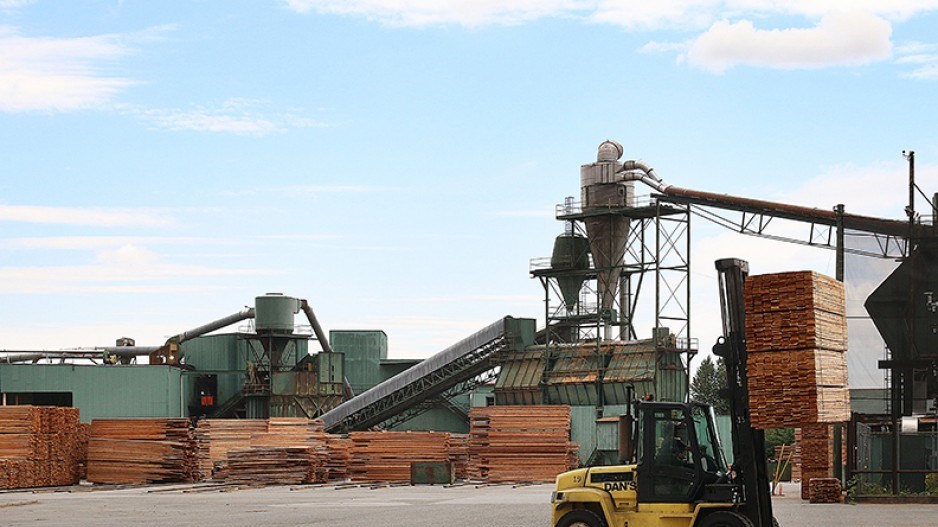Thousands of logging, sawmill and pulp and paper mill jobs may be lost in B.C., if the 2.6 million hectares of old growth being made off-limits to logging through temporary deferrals become permanent, warn forestry sector industry groups.
Even if the deferrals are temporary, jobs will be lost, warns Bob Brash, executive director of the Truck Loggers Association.
“Make no mistake, based on the limited information provided by government, the deferral of 2.6 million hectares of deemed at-risk forests will in fact result in immediate and long-term impacts on B.C.’s forestry sector,” Brash said.
He was reacting to the B.C. government’s announcement that it will place a moratorium on logging on 2.6 million hectares of old growth forest that is currently unprotected. The deferrals are on what the B.C. government deems to be the most at-risk stands containing big, ancient or rare old growth trees.
While the deferrals are said to be temporary – two years – they could become permanent, depending, in part, on the support the deferrals receive from First Nations involved in forestry.
“Today’s old growth announcement by the BC government to defer 2.6 million hectares of forests is extremely concerning to Canfor,” said Canfor CEO Don Kayne.
“If fully implemented, it would have significant impacts on our hard-working employees and their families, along with our Indigenous partners, contractors, communities, and the entire industry
B.C. Forests Minister Katrine Conroy said 4,500 jobs could be lost, if the deferrals all become permanent. Brash suggested the job losses would be much higher than that.
“Government’s estimated 4,500 jobs lost will likely be far higher, plus associated shuttering of multiple sawmills and value-added plants, and will cause billions of dollars in lost GDP to the province along with the associated loss of government revenues.”
The impacts of deferrals becoming permanent would likely hit the coastal forest industry hardest, since about half of the coastal annual allowable cut is old growth.
B.C.’s forestry sector is highly integrated, with pulp and paper mills, other valued-added manufacturers, and wood pellet producers relaying on byproducts and waste from lumber mills. When those lumber mills permanently close, it can have a domino effect on other producers, like pulp and paper mills, which provide high-paying jobs and significant municipal tax revenue.
The Council of Forest Industries (COFI) warns there could be more than a dozen sawmills and two pulp mills shuttered, if the deferrals are permanent.
“While we are still digesting the details, our initial analysis indicates that these deferrals would result in the closure of between 14 and 20 sawmills in B.C., along with two pulp mills and an undetermined number of value-added manufacturing facilities,” COFI president Susan Yurkovich said.
“This represents approximately 18,000 good, family-supporting jobs lost, along with over $400 million in lost revenues to government each year – revenues that help pay for healthcare, education and other services British Columbians count on.”
When announcing the deferrals today, government officials admitted no socio-economic impact analysis has been done on the consequence of removing so much timber from the Crown Timber Harvest Land Base.
Brash said “it is incomprehensible that a parallel socio-economic analysis to quantify the impact to people, families, communities, and the sector had not been done prior to this decision.”
Leonard Krog, former long-time NDP MLA and current mayor of Nanaimo, has expressed concern about the lobbying efforts to make old growth off limits to logging. He has questioned estimates that just 3% of productive old growth remains in B.C.
“This will take a long time to digest and the impact is going to be significant,” Krog said, in response to Tuesday’s announcement. “I hope the debate which has to follow will be based in reality not rhetoric.”
While coastal towns like Nanaimo, whose economies are still heavily reliant on sawmills and pulp and paper mills, would be hardest hit by mill closures, the impacts would be felt in the Lower Mainland as well, as there are large sawmills in Vancouver, Surrey and Richmond.
“The deferral process is going to jeopardize many businesses,” warned Surrey Board of Trade president Anita Huberman.
“Hundreds of employees will be laid off due to this deferral process. Every day, businesses are making tough decisions on how to preserve their bottom line and remain profitable, and this deferral will have devastating impacts on B.C.’s economy, and people’s livelihoods.”
Should deferrals become permanent, the government would have to compensate companies that hold long-term tenures for loss of cutting rights. This could run into the hundreds of millions of dollars.
Western Forst Products (TSX:WEF), which owns TFL-44 on Vancouver Island, along with the Huu-ay-aht, which own 35%, said it is still digesting today's announcement.
"Determination of potential impacts will be subject to further dialogue with the First Nations on whose territories the company operates and their government-to-government discussions," the company said in a statement to BIV News.
"Should the proposed measures impact Western’s business, the company will seek support from the province for its workers and full compensation for investments."
Teal Jones, which owns TFL-46, and has been the target of much of the anti-logging protests on Vancouver Island, said the company is concerned about the lack of consultation with the businesses most affected by the decision.
"We are concerned this significant change is being made with little or no consultation with the industry, First Nations, unions, and forestry communities," the company said in a news release.
"Process changes of this magnitude have the potential to disrupt the lives of thousands of British Columbians, and should be made with all the facts, science, and perspectives on the table."




